|
As part of our continuing commitment both to Walking Together with First Nations Peoples and to inter-faith relations, it was particularly good to come together on the International Day of Peace this year to receive and affirm the Uluru Statement from the Heart, including the Voice to Parliament. Not least we were blessed with Charles Prouse, author of One the Voice to Parliament, and a Nyikina man from the Kimberley, Western Australia, with over 20 years' experience in Indigenous affairs across Australia. My own words on this occasion, including my video version of a keynote prayer for all faiths can be found below...
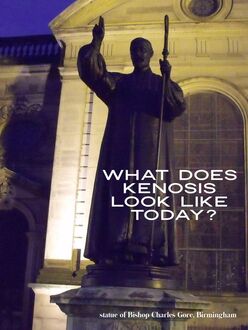 One of the features of Fr Peter Maher’s funeral this week was (as in death so in life!) the powerful struggle within it between two forms of Catholicism - one in which I passionately share spiritually (with others of other labels); and the other still addicted to power rather than justice, law rather than grace, patriarchy rather than the dynamic mutuality (with appropriate recognition of charisms) of the priesthood of all believers... 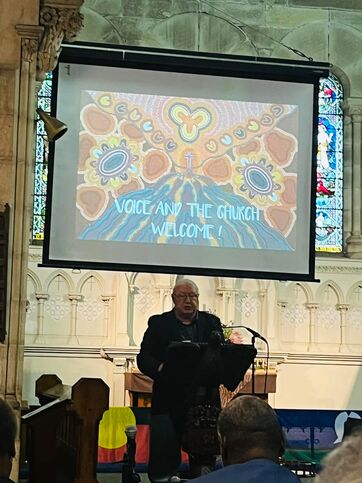 Among the several fine contributions to last Saturday’s ‘Voice and the Church’ gathering was that by the Revd Dr Rangi Nicholson, Assistant Priest of Rangiatea Church, the oldest Māori Anglican Church in Aotearoa, and author of ‘Treaty, Church and Nation’, reminding us that though our own struggles are specific they are also common and enriched by solidarity with others across the globe. He spoke powerfully of what needs doing from Māori and Anglican experience in Aotearoa New Zealand - including how, without meaningful resources empowerment is limited, and how the Church needs to be held accountable for benefitting from oppression. There is so much, he rightly identified, that the Church needs to do in terms of recognition, repentance, restitution and reparation. His three future hopes are pertinent to struggles in Australia too, and beyond: 1. More commitment by the Church to truth telling and ‘the whole story’ - with repentance and reparations 2. the Church needs to put its own house in order re authentic partnership whilst offering constructive critique of Government’s commitment to the UN rights of Indigenous People, reimagining a more just Church and nation. 3. the need for the Church to contribute boldly and with love to a new constitution - to visioning and values clarification for the future of the country - as part of restorative justice As he says: Whilst Treaty, in the experience of Aotearoa, can be a ‘sacred covenant’ allowing new life and renewed attention, there needs to be much more - for: ‘Restorative justice needs to become a priority’ - led with young people... 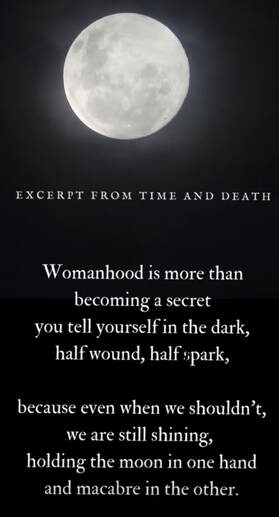 words by Nikita Gill words by Nikita Gill I am praying in the next few days for women in the many denominations of the Church, as some of my dearest Australian Anglican friends gather in Sydney for a Movement for the Ordination of Women gathering to mark the 30th anniversary of Anglican women's ordination in Australia. Due partly to family circumstances, neither Penny not I are attending ourselves. To be honest, we were also quite saddned that our offer of hosting an ecumenical communion service at Pitt Street UC was rejected - leaving the conference with no public female-led Anglican communion, due to Sydney diocese gynophobic policies. We had also hoped that, with such Anglican female sacramental leadership, this might be a way of connecting, celebrating, and empowering women from many traditions. It seemed a creative way of both honouring the more militant character of MOW, without which women would all still be waiting, and also contribute to the vital tasks of intersectional solidarity we need today. However we truly and warmly wish everyone well and hope that it may help renew the continuing work of Christian feminism which remains so vital... It has been good in recent weeks to link up with other Uniting Church members in forwarding our shared commitment to Walking Together with First Nations peoples in Sydney, and further afield. This has included marking the Day of Mourning (on the nearest Sunday to 26 January) at Pitt Street Uniting Church, meeting with others on the steps of Pitt Street UC to share in the Survival Day March on 26 January, marking at Pitt Street the 14th anniversary of the National Apology to the Stolen Generations and linking more closely with other Uniting Church leaders and First Nations peoples locally in order to take next steps on the journey towards justice and healing. We have been particularly blessed in the leadership and encouragement of Nathan Tyson (Manager, First Peoples Strategy and Engagement, Uniting Church in Australia Synod of NSW and the ACT) - see further his article in Insights on the recent 26 January events and associated issues.
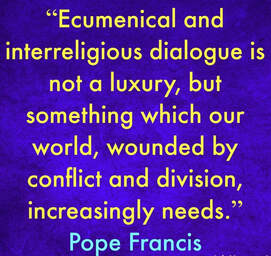 an introductory reflection offered to a recent NSW Ecumenical Council discussion by Josephine Inkpin Firstly let me acknowledge country – in particular the land of the Gadigal people of the Eora nation on which I live: their elders past, present and emerging. I also acknowledge all First Nations people here. I do so as right and proper. I also do so as this immediately focuses our discussions. For I live in a suburb (Forest Lodge) named after the house of Ambrose Foss, one of Pitt Street Uniting Church’s distinguished early founders. Next door is the suburb of Glebe: a name also witnessing to Christianity’s role in the dispossession of First Nations peoples. Such naming highlights how so many of our conventional expectations and faith stories are tied up with power. This lies at the heart of many divisions, embedded in our ways of thinking and being. Thanks be for God’s grace, these things are not intractable. Yet, without at least naming them, we will not go far in addressing the polarisation they help cause... a reflection on the journey to genuine 'inclusion' for the Diversity & Inclusion Council of Uniting NSW/ACT
Thank you so much for the opportunity of sharing with you today. Let me first acknowledge the Gadigal peoples of the land from which I speak, and their elders past, present and emerging. I would also like to express my thanks for the work Uniting is already doing in terms of diversity and inclusion, including the vital encouragement this is to myself personally. For genuine visibility of our human diversity is so critical and enriching, as I know from my own experience and the huge number of people who contact me, from all kinds of places. joyfully receiving gifts One of the things I have learned from First Nations peoples is the importance of genuineness of spirit and intent. Back in 1986 in Alice Springs, Pope John Paul II put this well in sharing with Aboriginal and Torres Strait Islander peoples. ‘Until your gifts have been offered’, he said, ‘and joyfully received, the Church in Australia will not be that which Jesus Christ wants to see.’ That challenging truth remains central not only to the Church, but to all parts of Australian life. Until First Nations’ gifts have been fully offered, and joyfully received, with justice, then we will never be the country we can be. That must be the underlying theme of all we do in terms of diversity and inclusion. Yet those words apply more broadly, don’t they? Until the gifts of Asian, Pacific Islander, Middle Eastern, African, LGBTQ+ people, and all kinds of Australians have been offered, and – crucially - ‘joyfully received’, then we will not be what we can be. ‘Joyfully’ is a key adjective. What spirit and intent do we really have? If we approach inclusion mainly as an obligation (politically correct or otherwise), we will have missed the point. For one thing, anyone feels more likely to offer their gifts if there is likely to be a joyful reception. We will never maximise the capacity of any organisation, whether a church, a nation, or Uniting, if we do not joyfully embrace the gifts we are offered. What an opportunity we have as we emerge from, hopefully, the worst of what COVID-19 has done to expose the divisions and distinctions of wealth and power among us in Australia! To build back best, fully, and joyfully, enabling diversity and inclusion is vital. The character of our intent and its spirit is crucial. weak inclusion - as a noun In my experience, ‘inclusion’ can be a very weasel word, covering many continuing sins and PR appearances. Organisations have at least three approaches. The first is what I would call ‘weak’ inclusion. It is better than obvious exclusion but essentially about degrees of permission to belong. It is like a noun: it is somewhat fixed, concerned with quotas and boundaries, but really still involving social distancing rather than engagement. At times and in places, the Uniting Church exercises this kind of inclusion. You can belong as a minority, but are you really honoured, engaged, and joyfully received? That too is where many First Nations people were in Anglican circles in Southern Queensland, including in Anglicare, until we began our Reconciliation Action Plan a few years ago. medium inclusion - as an adjective Secondly, there are ‘medium’ approaches to inclusion. This is what I have experienced in moving into Uniting Church ministry. It involves a genuine welcome, with some affirmation, openness to involvement, and certainly much kindness. Whereas ‘weak’ inclusion is mainly being allowed to the table, this might even include being at the head of the table. Other than Anglo ethnicities, and LGTBQ+ and other networks are also taken with some seriousness. Inclusion becomes more like an adjective than a noun – it is about being inclusive, more dynamic than simply inclusion. It is where the Reconciliation Action Plan was in the Anglican Church Southern Queensland when I left, and maybe, where Uniting is right now. It is, however, only a happier, but not yet fully joyful stage. strong inclusion - as a verb A third stage of inclusion has a deeper spirit and intent. This ’strong’ stage is not about even genuine welcome, but about revealing the gifts of all. It includes affirmation but is really about celebration, led by everyone in our diversity when we are all truly empowered. It is about inclusion as a verb: about active practice day by day; including like Uniting, as a dynamic community of living and belonging. It is also wonderful for any organisation. For we no longer have to work hard at showing we are diverse and inclusive. We demonstrably are. It is our very DNA. Others see it, which also saves many promotional expenses! The Uniting Church aspires to this, and at times manages it. The most visible sign is the Covenant with Uniting Aboriginal & Islander Congress - although, even there, questions remain, including about resourcing and how voices are actually heard and make a difference. Yet the Uniting Church as a whole is not there yet. I sense however that Uniting can move into at least some kind of ‘stronger’ inclusion, where all levels of staff and operations see it as their own work. That is another major shift, but ultimately, as it becomes more natural, it in fact requires less work from advocates and leadership than ‘weak’ and ‘medium’ inclusion – for it belongs to everyone, when everyone truly belongs. True including thus also leads on to expansiveness. sea-change We live in the tag end of some frankly rubbish times, when the very dignity of some human beings has been under question. We have major policies of exclusion in Australia, including towards First Nations claims for justice, towards refugees, some migrants and the poor. Currently, we also have hurtful bills of religious discrimination in federal and state parliaments. Yet my belief is that these are rotten but passing times. I see the journey towards Australian diversity and inclusion as like a sea-change. The waves come in at different speeds. Sometimes they rise high: as with the 1967 Referendum, the Apology to the Stolen Generations, Marriage Equality, and so forth. At times they fade away and we think the tide has gone. Yet it will assuredly return. The key thing is to hold faith and make ready for the next big wave of Australian diversity and inclusion. It will come, and those who are prepared can surf it. Others who do not prepare will flounder. For there is, let’s face it, no vibrant and really sustainable future for Australia without renewing our multicultural identity. Uniting is well placed to seize that time when it comes, if it continues to move more deeply into diversity and inclusion. So, May God bless us all in this exciting journey! |
AuthorJo Inkpin is an Anglican priest serving as Minister of Pitt St Uniting Church in Sydney, a trans woman, theologian & justice activist. These are some of my reflections on life, spirit, and the search for peace, justice & sustainable creation. Archives
July 2024
Categories
All
|
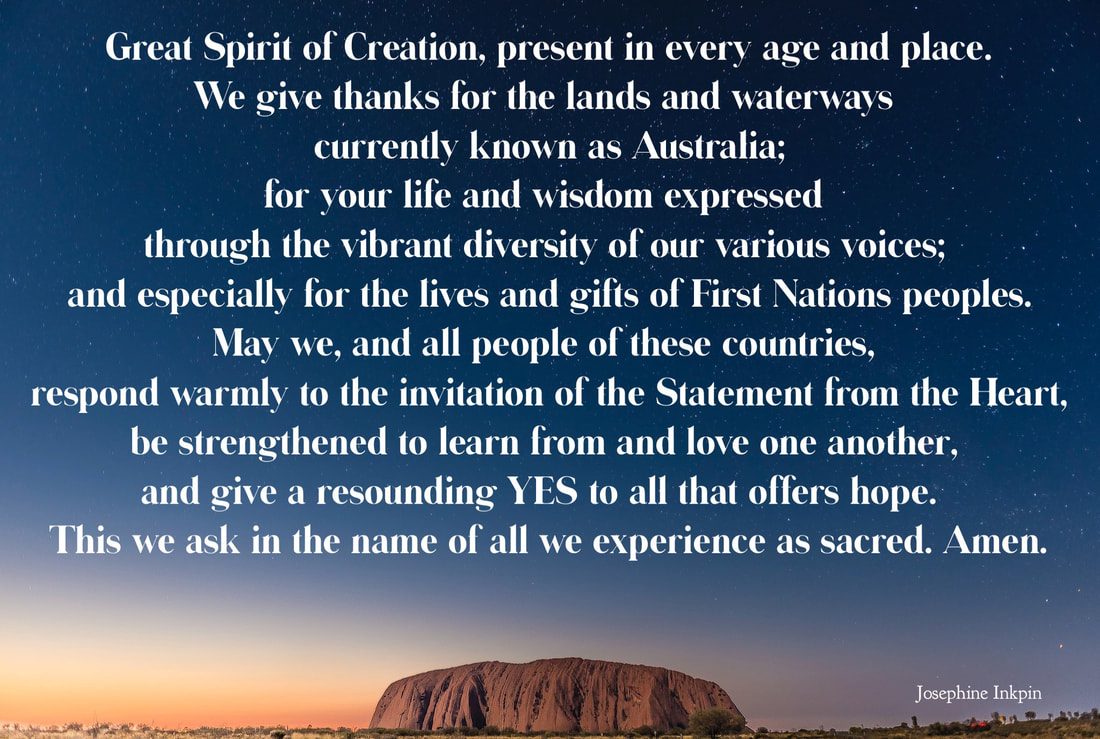
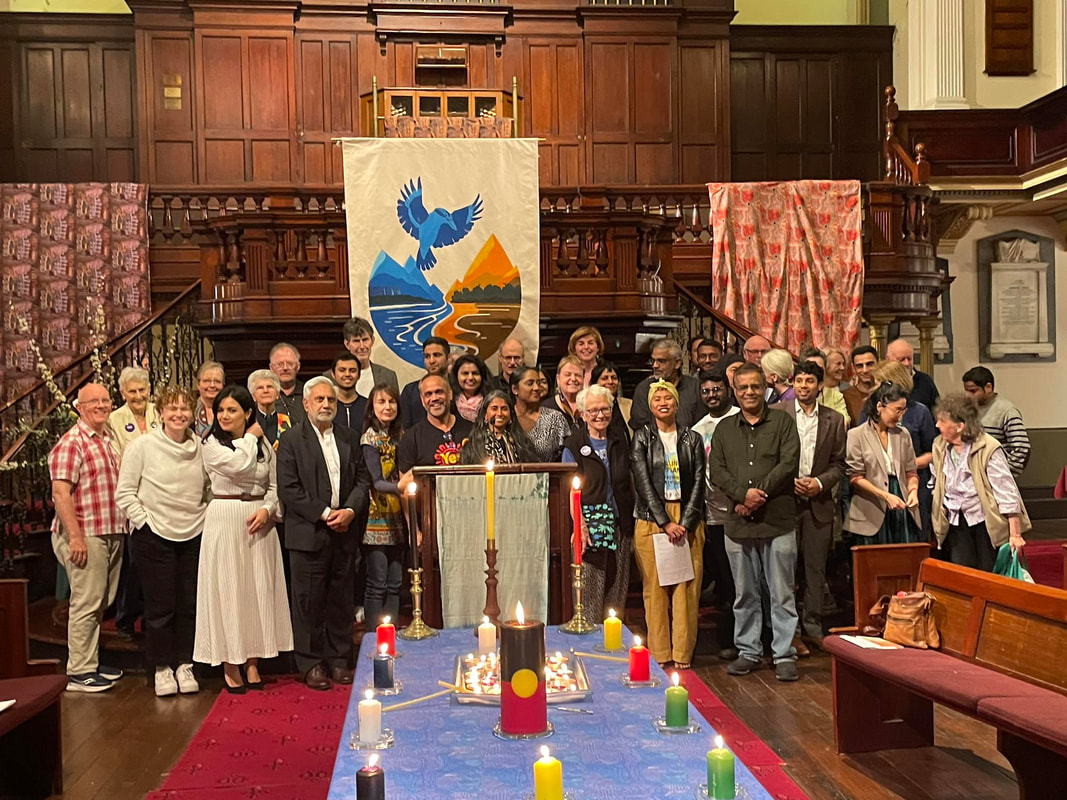
 RSS Feed
RSS Feed